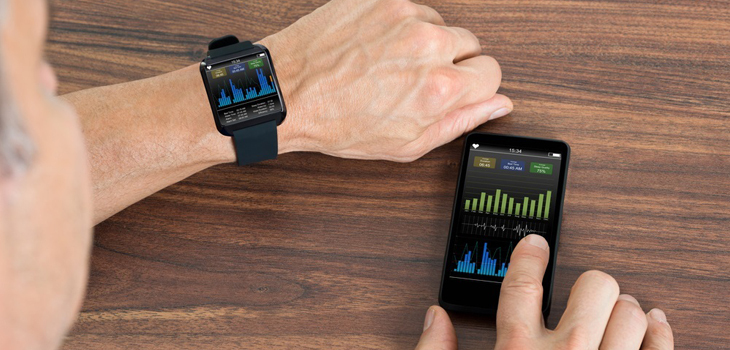Fitness trackers are among the most popular technological devices on the market. It can track the number of steps taken each day, measure the heart rate, count the calories consumed, and even evaluate sleep quality. Few of the models on the market can even measure blood oxygen levels and track an individual’s physical activity by monitoring their daily running, walking, or biking route using GPS technology. Fitness trackers have attracted increasing attention in recent years, with the global wearable technology market increasing by 172 % in 2015, as per International Data Corporation. Many people have already started to incorporate this “wearable” technology into their daily lives. Most fitness trackers are worn on the wrist and link to a computer or smartphone to record data over time. Is there any truth to all of this frenzy?
Why Should One Wear a Fitness Tracker?
It is common knowledge that it is critical to exercise on a regular basis, especially as one ages. Several studies have shown that physical activity can increase longevity, reduce the risk of cardiovascular disease and stroke, and delay the onset of dementia. A regular exercise routine is essential for keeping the body looking and feeling young. Many people, however, find it difficult to stick to a consistent workout routine. This is where fitness trackers can help.
Fitness trackers are wearable computers that monitor daily workout metrics such as distance walked, calories burned, and so on. These are marketed as essential tools for weight management, enhancing fitness, and significantly improving wellness. In some ways, it could be described as a health device designed to monitor an individual’s level of physical activity. It comes in a variety of shapes and sizes, ranging from basic models that are little more than glorified pedometers to advanced smartwatches that can track the body’s vital signs in minute detail.

Tracking one’s fitness activity level is an important step in taking control of one’s health because it makes the person more aware of their health. A record of one’s activity level and vital signs is a useful tool to share with one’s primary care physician or personal trainer. Having hard data makes it easier to plan and stick to a sustainable routine. These devices can help people transition to a healthier lifestyle by increasing their awareness of their habits and providing a motivating reward for activity in the form of sharing accomplishments.
Below are a few of the benefits and disadvantages of wearing a fitness tracker
The Benefits of Wearing a Fitness Tracker Include:
It Aids in The Maintenance of a Routine
Many people find it frustrating to exercise blindly without any way of tracking their progress. When one has no way of knowing if their efforts are bearing fruit, it can be difficult to find the motivation to get moving. Wearing a fitness tracker allows people to see and adjust their progress in real-time. People who walk 5,000 steps per day can set a goal of gradually increasing their total number of steps taken to the recommended 10,000 steps per day by keeping an accurate step count. Seeing the numbers improve has been found to motivate people, making it easier for them to stick to the routine.
It Prevents Inactivity for An Extended Period
The majority of modern people spend far too much time on their couches. Too much sitting can be fatal. Getting up and moving for 15 minutes each hour you sit is a good rule of thumb. For this reason, many fitness trackers include built-in reminders to help people remember to get up and move throughout the day.
Maintains A Record of Dietary Preferences
Many fitness trackers allow the user to enter their everyday food and water intake into the integrated apps. These devices help ensure that the body receives adequate nutrition by keeping track of what the user eats. Tracking food consumption has been shown in studies to effectively help manage weight, even when the individual does not follow a specific diet plan. The information gathered by the device can also assist a dietitian or personal trainer in gaining an understanding of the individual’s daily meal plan. These experts can then use this information to assist the user in developing a healthy diet.
The disadvantages of owning a fitness tracker:
It Can Be Exhausting
Some people may be perplexed by the amount of data recorded. Many devices provide more features than the average person requires, and the high price of some premium models indicates that they may not be the wisest choice. For those who are less technically savvy, the device’s smartphone app may be difficult to use or simply not worth the effort.
Users should look for devices that track key parameters for them, such as heart rate, daily steps taken, calorie count, and so on. Models with superfluous features would not only be more expensive but would also overburden the individual’s mind with unnecessary information.
Risk of Obsession
The detailed statistics provided by a fitness tracker can be a huge motivator for some people. For others, however, this could be the start of an obsession. Many people become obsessed with achieving perfect stats and risk overworking themselves in order to do so. It is critical to understand that the figure displayed on the screen is only an estimate of a person’s daily activity, not a measure of their self-worth. In addition, fitness trackers are not completely medically accurate in terms of stats, and there can be significant differences between models.

In the Long Run, It Is Not as Useful
While a fitness tracker can be an effective tool for motivating people to exercise in the early stages of their fitness journey, it may not as effective for maintaining weight over time. According to a survey, approximately one-third of people who purchased fitness trackers discontinued using them after 6 months. Few studies have even discovered that these devices are not as effective in assisting people in managing their fitness as most people believe. Using this device for physical training does not guarantee fitness. Commitment and perseverance in sticking to a workout routine are the true cornerstones of fitness. If the fitness tracker helps you reach this goal, that’s fantastic! If not, a different approach may be more effective.
Conclusion
A fitness tracker, when used correctly, can be a useful tool that provides detailed feedback on the body’s activity level and other aspects of health. It can be a worthwhile investment if one needs an extra push to get moving or wants to keep a close eye on their progress. However, if the individual has a tendency to obsess over minor details or does not require the extensive data that a fitness tracker provides, they can opt for a different method to measure their fitness level. In the end, it is up to the individual to decide how they want to track their daily activities. Regardless of which alternative an individual chooses to stay fit, it’s important that they keep moving and stay healthy.

